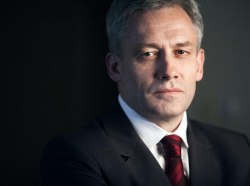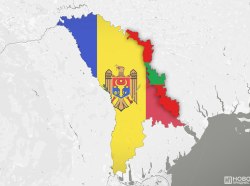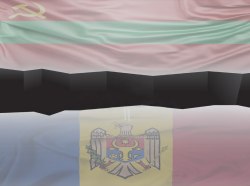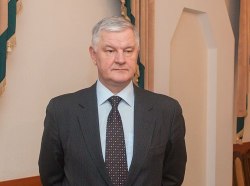The PMR is forced to strengthen the military efficiency of its peacekeeping forces
In response to the deployment of Moldovan carbineers in the Security Zone, an aerial phototopographiс survey by Romanian aircraft of the Pridnestrovian territory and the conduct of the NATO-Moldova military drills, Pridnestrovie has launched inspection of its military units. First of all, Pridnestrovian President Yevgeny Shevchuk visited the Second Peacekeeping Battalion, deployed in the town of Dubossary. This seemingly quite an ordinary visit attracts much attention because of another aggravation of situation near the country's borders.
AMD threat
NATO has just recently inaugurated its first European missile interception centre in Romania. The facility, which is nearly 200 km away from Bucuresti, will host three anti-missile defence (AMD) batteries equipped with 24 SM-3 missile launchers (max. range 3,000 km). Following the good tradition, NATO explained the necessity of launching the AMD centre by threats from Iran, and Bucuresti stated that the system is not directed against Russia.
At the same time, according to Russian experts, the missile launchers deployed in Romania can be used to fire cruise missiles, including long range missiles.
Amid amicable statements by Bucuresti, reports from Tiraspol on widespread violations of the country's airspace by Romanian double-purpose aircraft became quite resonance. These flights were not coordinated with the Pridnestrovian authorities.
As Kishinev's official representatives to the Joint Control Commission (JCC, the governing body of the peacekeeping operation), these aircraft made an aerial survey of the Pridnestrovian territory for making orthophotographic charts by Moldova's request.
Pridnestrovie, however, supposes that these flights might have been made for intelligence purposes. It is no accident that the aerial survey focused on the facilities of the Operational Group of Russian Forces (OGRF) in Pridnestrovie, and first of all on the biggest munition depots in Eastern Europe located in the Kolbasna village.
«On 17 April alone aircraft made 16 flights in one direction and 16 flights in the opposite. This shows that increased attention sticks to this facility. They say they need it for chart-making, but we doubt it," Pridnestrovie's co-chair to the JCC, Oleg Belyakov, said in an interview with RP.
Moreover, the Prednestrovian side has been demanding for a month that these incidents be discussed at JCC meetings, including JCC emergency meetings. But up to now Moldovan delegates have been avoiding a dialogue.
High alert
Pridnestrovian negotiators' basic message lies in the necessity of controlling processes in the Security Zone. This was the reason why the JCC was established in 1992 in compliance with the agreements on principles of peaceful settlement signed by the presidents of Moldova and Russia. In previous years the JCC's control functions helped to maintain peace and security in the region, suppressing emerging flashpoints of tension.
According to Tiraspol's officials, Moldova's unilateral activities in the Security Zone, bi it unsanctioned flights by foreign aircraft or the deployment of additional Moldovan forces on the demarcation line, set a dangerous precedent. The Pridnestrovian co-chair earlier told RP about the dispatch of Moldovan carabineers to Vadul lui Vodă location in the Security Zone.
Such reinforcement of law enforcement units ahead of summer is not unique. But earlier it was held in compliance with the approved mechanisms and under the control of military observers. This time the notification came long after the law enforcers had been deployed in the Security Zone. The Moldovan side denied Pridnestrovie's proposal to hold a monitoring of the dispatched units.
«We also know that 30 more servicemen, 5 vehicles and other hardware are supposed to reinforce the police unit since 30 June. It is necessary to settle the weapon issues, to identify who these servicemen are and determine the regime of their service. This is what military observers should find out," said Oleg Belyakov.
He also complained about the lack of control over the quantity and quality of Moldovan law enforcers' weapons. The Moldovan side has deliberately refused to register weapons with the JCC. «In other words, we are not informed about the number and types of weapons these units have. Of course, this situation represents danger," said Oleg Belyakov.
Tiraspol has naturally responded to the aggravation of the situation near its borders by strengthening the country's military efficiency. A joint Russian-Pridnestrovian military parade, which took place on 9 May in Tiraspol, allowed experts to speak about the increased professionalism of the republic's military forces, qualitative changes in the army's equipment.
Special attention has been given in the past four years to increasing the military efficiency and enhancing material and technical basis of Pridnestrovian peacekeepers. Back in 2012 these units were in quite a deplorable state. The peacekeeping units experienced personnel issues and poor service conditions. Today the situation has changed.
«It is my considered opinion that today the PMR's peacekeeping forces are in a good state, comparable to that of Moldovan and Russian peacekeeping forces," underscored Oleg Belyakov.
Last week, amid potential and real threats, the president approved a territorial defence plan. «The country's territorial defence plan has been elaborated in the execution of the order of the Security Council of the PMR with due regard to the changing situation," said President Yevgeny Shevchuk.
The Pridnestrovian delegation earlier requested their Russian colleagues to resume a helicopter squadron's flights as part of the current peacekeeping operation.
«This request does not contradict the cooperation procedures in the Security Zone as Russia, in compliance with the previously signed many-sided, that is with the involvement of Moldova, agreements, has the right to restore the number of its peacekeeping contingent in Pridnestrovie to, as far as I remember, 3,200 servicemen and deploy a helicopter squadron in Tiraspol. This is stipulated in the documents," concluded Shevchuk.
It should be noted that Pridnestrovie must be concentrated more than ever and adequately respond to foreign policy fluctuations. And though the resumption of the 5+2 format talks and Russian peacekeeping mission alleviate tensions, Moldova's unilateral actions do not give reason for composure.








